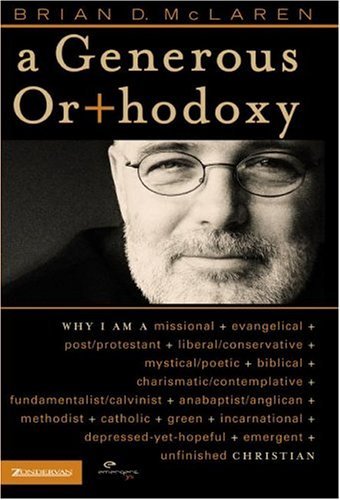Book Notes
 Brian McLaren, A Generous Orthodoxy (Grand Rapids: Zondervan, 2004), 297pp.
Brian McLaren, A Generous Orthodoxy (Grand Rapids: Zondervan, 2004), 297pp.
Here is a noteworthy book making the rounds that deserves your attention. Brian McLaren founded Cedar Ridge Community Church in the Baltimore-Washington corridor, has authored more than a half-dozen books, and is the de facto leader of the so-called Emergent Church movement. On the Emergent Church see www.emergentvillage.com, and the cover stories in Christianity Today (November 2004) and The Christian Century (November 30, 2004). In his own disarming style he describes himself as a theological amateur who has never taken a for-credit seminary course, even though last year Carey Theological Seminary in Vancouver granted him an honorary doctorate, and his speaking schedule around the country is booked 18 months in advance.
You have to love the subtitle of A Generous Orthodoxy, even if you quibble with McLaren's confessional-like manifesto; and he has detractors aplenty: "Why I am a missional + evangelical + post/protestant + liberal/conservative + mystical/poetic + biblical + charismatic/contemplative + fundamentalist/calvinist + anabaptist/anglican + methodist + catholic + green + incarnational + depressed-yet-hopeful + emergent + unfinished CHRISTIAN." If this sounds glib, cavalier, or contrived, at times he reads that way, gliding over complex matters in an evasive or superficial manner. Scholars in the professional guild will have their bones to pick.
But McLaren intends to provoke, and so he deliberately adopts a playful, mischievous persona. There is a method to his madness. He is very serious about pushing Christians beyond their ghetto mentality, political fault lines, and petty arguments about peripheral issues, their sometimes well-deserved reputation for arrogance, exclusivity, and insensitivity, to the urgent business of, well, a robust commitment to the ancient orthodox faith that is boldly generous. McLaren's mantra and book title come from the Yale theologian Hans Frei (1922–1988), who coined the term as he worked to move the church beyond the liberal-conservative impasse. "Generosity without orthodoxy is nothing," wrote Frei, "but orthodoxy without generosity is worse than nothing." Other patron saints with whom McLaren's "generous orthodoxy" identifies include GK Chesterton, Stan Grenz, Leonard Sweet, Walter Brueggemann, and Lesslie Newbigin.
McLaren defines "orthodoxy" as "what God knows, some of which we believe a little, some of which they believe a little, and about which we have a whole lot to learn." Or again, "how we search for a kind of truth you can never fully get into your head, so instead you seek to get your head (and heart) into it." He rightly admits that this is "an unorthodox definition of orthodoxy" (p. 28). He is right. As careful Christian thinking or theology, his definition would barely get a passing grade. As for his intentions for Christian modesty, I like what he does. But this definition is a good example where his concerns for style, strategy and substance merge, collide and confuse.
McLaren writes for "the Christians.....who are about to leave (or have just left) the whole business because of the kinds of issues I raise in this book. And equally, I'm writing for the spiritual seekers who are attracted to Jesus, but they don't feel there is room for them in what is commonly called Christianity unless they swallow a lot of additional stuff" (p. 39). In particular, he takes a softer approach to hard questions like hell and Christianity's relationship to other religions, although he does not suggest anything like nuanced alternatives that many other reflective believers have offered.
Generous orthodoxy and the Emergent Church movement seek to move beyond staid, traditional church in general, but very interestingly they also intend to offer an alternative to the "seeker sensitive" megachurches like Saddleback and Willow Creek. In my mind, those worthy goals merit serious reflection and gratitude to the likes of McLaren for leading the way.


